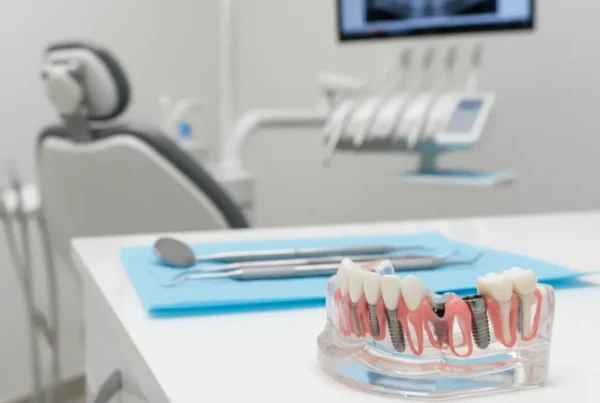“Not enough bone for traditional dental implants?” That used to be a major obstacle—but thanks to advances in modern dentistry, it doesn’t have to be anymore. At Gentle Grand Prairie Dentist, we’re proud to offer new, patient-focused solutions that expand what’s possible for those dealing with advanced bone loss. If you’ve been told you don’t qualify for implants because of low bone density, basal dental implants might be the breakthrough you’ve been waiting for.
Let’s take a closer look at how basal implants work, what makes them unique, and who may benefit most from this innovative approach.
What Are Basal Dental Implants?
Basal implants differ from traditional implants in both placement and purpose. While traditional implants are secured into the spongy, alveolar bone—the soft bone near the surface—basal implants anchor into the denser, more stable cortical bone, also called the basal bone. This layer of bone resists resorption over time and provides a strong foundation, even in patients with significant bone loss.
Because of this approach, basal implants often eliminate the need for bone grafting or sinus lifts. Patients can receive their implants—and their new teeth—much faster. In fact, many cases allow for immediate loading, meaning a fixed prosthesis can be placed within 72 hours.
Key Differences from Traditional Implants
What really sets basal implants apart is their adaptability. These implants are often one solid piece, reducing the risk of mechanical complications. They’re ideal for patients with limited bone volume or a long history of wearing dentures, which often leads to jawbone shrinkage.
Unlike traditional implants that may require multiple procedures and months of healing, basal implants are designed to simplify the process. You’ll skip the bone grafts and enjoy faster results. Plus, their placement into stable, high-density bone means long-term durability with fewer complications.
This approach is life-changing for patients who were once told implants weren’t an option due to insufficient bone structure.
Who’s a Good Candidate?
Basal implants are an excellent option for individuals who previously believed implants were out of reach. If you’ve suffered from advanced bone loss, have worn removable dentures for years, or want to avoid lengthy surgeries, you may be a great candidate. These implants are also a strong solution for patients who need full-mouth restorations in a shorter timeframe.
During your consultation, we’ll perform a full evaluation, including 3D imaging, to assess your bone density, oral health, and treatment goals. If you’re medically stable and committed to aftercare, basal implants could be the fast, stable solution that brings your smile back to life.
The Procedure: What to Expect
One of the biggest benefits of basal implants is how straightforward the process can be. After a comprehensive exam and digital imaging, we’ll create a detailed treatment plan. Our goal is to ensure a smooth experience from start to finish.
During the procedure, the basal implants are placed into the cortical bone using minimally invasive techniques. In most cases, we can attach a fixed dental prosthesis within 72 hours. That means no temporary dentures, no waiting months for results—just a faster return to normal life with a stable, natural-looking smile.
Benefits of Basal Implants
The list of benefits for basal implants is long. Most importantly, patients can skip bone grafts and sinus lifts, which are often required with traditional implants. This leads to shorter treatment timelines and fewer surgical procedures overall.
Basal implants are less invasive, yet highly stable. They’re well-suited for complex cases and often prove to be more cost-effective when compared to the traditional multi-step process. Plus, they perform well in patients with a history of gum disease or mild systemic health issues that might complicate traditional implant placement.
If you’ve ever felt like full-arch implants were out of reach, this could be the alternative that opens the door.

Risks and Considerations
While basal implants offer incredible advantages, they do require thoughtful planning and proper case selection. Not every dental office is trained in this technique, and success depends on the experience of the provider.
Basal implants may not be ideal for patients with uncontrolled diabetes or other untreated systemic health conditions. Additionally, immediate placement and loading demand precision and careful evaluation to ensure long-term success.
That’s why choosing a team with advanced training and modern tools—like ours—is key to a safe, predictable outcome.
Why More Dentists Are Offering Basal Implants
As technology has improved, more dentists are turning to basal implants to expand care options. These implants open new doors for patients who have been turned away from traditional treatments. They’ve proven to be stable, reliable, and efficient—even in difficult cases.
We’ve seen first-hand how basal implants can restore chewing ability, improve confidence, and eliminate the daily frustrations of removable dentures. They’re not just functional—they’re transformational.
Gentle Grand Prairie Dentist: Your Implant Partner
We believe every patient deserves a chance to smile with confidence—regardless of how much bone they have left. That’s why we offer comprehensive implant consultations that explore both traditional and advanced options like basal systems.
During your visit, we’ll review your 3D scans, talk through pros and cons, and explain your timeline and budget clearly. No pressure. No surprises. Just expert care and honest advice from a team that’s here for you.
Ready to Explore Your Options?
If you’ve been told you’re not a candidate for implants—or if you’re just ready for a better, faster solution—it’s time to talk. Call Gentle Grand Prairie Dentist and schedule a consultation. We’ll help you explore basal dental implants and other options designed to bring your smile back to life.
Book an appointment with Grand Prairie, TX’s top dentist, Dr. Khademazad, today. It’s the first step to a better smile and increased self-esteem. Act quickly to enjoy a beautiful, straight smile without the pain of traditional braces. Call us at 972-988-0900.
Schedule Your Consultation Today!
2475 W Pioneer Pkwy Grand Prairie, Texas, 75051
Google Reviews: See More Reviews From Grand Prairie Family Dental
View information about local places in our community.
Driving Directions to Our Practice
Are basal implants more or less expensive than traditional dental implants?
It depends on the case, but basal implants are often more affordable overall. Why? Because they usually don’t require bone grafting, sinus lifts, or multiple surgical stages, which can add significant cost to traditional implant procedures. Plus, since they’re often immediately loaded with a prosthesis, fewer appointments are needed. We’ll give you a full cost breakdown at your consultation so you know exactly what to expect—no surprises.
How long do basal dental implants last?
With proper care and placement, basal implants can last 15 to 20 years or more—very similar to traditional implants. The key to long-term success is good oral hygiene, regular dental checkups, and avoiding habits like smoking or teeth grinding. At Gentle Grand Prairie Dentist, we’ll walk you through exactly how to care for your implant to keep it strong and stable for the long haul.
Can basal implants be used in the upper and lower jaws equally well?
Yes! Basal implants can be placed in both the upper and lower jaws. In fact, they’re often ideal in areas where traditional implants might struggle—like the upper jaw with sinus proximity or the lower jaw with advanced bone loss. The dense basal bone exists in both arches, making these implants a flexible solution for full-arch or complex restorations.
What Are Dental Implants, Dental Implant Success, Types of Dental Implants, Managing Dental Implant Complications, Dental Implants Maintenance Tips, Variables That Influence Dental Implant Costs, What Are the Risks of Dental Implants?, Are You a Candidate for Dental Implants?, Crown vs Implants Which is Better?, Single Tooth Implants, Mini Dental Implants, Zirconia Dental Implants, Dental Bridge vs Dental Implants, Dental Implant Failure, Basal Dental Implants






